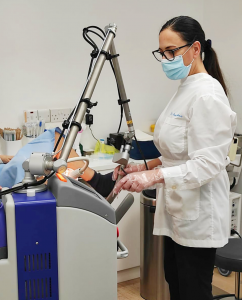Gynaecological services
Routine Gynaecological Procedures
The Cervical Smear or Pap test is a procedure to collect sample cells from a woman’s cervix and vagina. The intention is to detect any changes in the cervical cells, noticeable years before the development of cervical cancer. This allows for a complete treatment before cancer develops.
In our office, we use a modified and upgraded Pap test known as ThinPrep using liquid-based cytology. This technique is designed to reduce some of the technical problems inherent in the traditional pap smear.
The ThinPrep Pap method has some important advantages. It removes contaminants such as blood and mucus which may obscure cells in the traditional Pap smear. Also, a thin uniform monolayer of cells is possible making it easier to examine under a microscope. This greatly increases the Pap test sensitivity to detect abnormal cells.
During the PapTest examination, it is standard procedure for Dr. Kakkoura to also check the entire lower urogenital system. Many conditions, such as cervical polyps, vulvar and vaginal warts, vaginitis, Bartholin gland cysts, uterine prolapse, bladder or bowel prolapse, etc may be diagnosed with a simple gynaecological examination.


A preventive examination using gynecological ultrasound is highly recommended once a year within the framework of any woman’s annual gynecological check-up.
It is also imperative in the case of abdominal pain, menorrhagia (heavy bleeding during menstruation), uterine bleeding (bleeding regardless of menstruation), postmenopausal bleeding, and of course at any time deemed necessary by the doctor. It can take place on any day of the cycle, even during menstruation if necessary.
The gynaecological ultrasound allows for the examination of the size and morphology of the internal genital organs such as the uterus and ovaries and fallopian tubes.
It can diagnose the following pathological conditions:
- endometrial polyps
- fibroids
- adenomyosis
- ovarian cysts
- pathological conditions of the fallopian tubes (hydrosalpinx)
- endometrial and ovarian cancer
Warts are growths, resembling miniature cauliflower, that appear on the skin of the vulva, around the scrotum or anus, vagina, cervix, and penis. They are caused by
an HPV (human papillomavirus) infection. There are 190 types of HPV but most genital warts (91%) are caused by types 6 and 11.
Fortunately, warts are not dangerous and do not lead to cancer. However, they may cause irritation and discomfort, and, as the HPV infection may or may not have symptoms, you may unknowingly pass the HPV infection to other people during sexual intercourse. Using a condom only reduces and does not rule out the risk of transmitting the virus.
The HPV vaccine provides 100% effective prevention for HPV types 6 & 11 as well many other HPV types (16, 16, 18, 31, 33, 45, 52 and 58) responsible for 90% of cervical cancer cases.
Treatment for genital warts is personalized for each patient depending on the case and may be resolved with pharmaceutical means or surgical removal using diathermy or CO2 laser using local anesthesia.
In case the Pap test reveals cell abnormalities, the doctor will follow up with a colposcopy, an in-office simple, non-invasive, and quick diagnostic procedure (much like the Pap Test) that does not require anesthesia.
With the use of a Colposcope, an illuminated, magnifying instrument, the doctor can better access the cervical epithelium and special solutions are applied to the cervix to highlight any abnormal areas. In case of any suspicious areas, a small sample of tissue (a biopsy) is removed for closer examination in a laboratory to best access the severity of the condition and to give a final diagnosis to determine the need for
invasive or non-invasive treatment.
Dr. Kakkoura is certified in colposcopy by the Hellenic Society of Colposcopy and Cervical Pathology.
We provide guidance to women to choose the contraceptive method most suitable to their individual situation. We may also provide guidance for pregnancy planning and egg freezing.
Menopause is defined as the permanent stop of a woman’s menstrual cycle resulting from the change in a women’s hormones when women no longer produce as much oestrogen to release an egg each month.
Menopause is usually a gradual process. The period prior to menopause during which women may experience irregular periods and symptoms is referred to as perimenopause and may last up to 10 years usually starting between 45 to 55 years old. During this period, women experience both physical and psychological changes and may seek medical advice for any of the following symptoms including hot flashes, night sweats, mood swings, sleep disorders, vaginal dryness, etc. Research also links perimenopause to increased stress levels and depression in some women.
Hormone Replacement Therapy (HRT) or Non-Hormone treatments are available for menopause symptoms and/or to prevent loss of bone mass where necessary. We consider each woman individually to choose the best option for each case.
Vaginal atrophy frequently appears at menopause, when a woman’s body is producing less oestrogen. Oestrogen is the hormone responsible for vaginal lubrication.
A drop in oestrogen levels may also occur:
- During the years leading up to menopause (perimenopause)
- After surgical removal of both ovaries (surgical menopause)
- During breast-feeding
- While taking medications that can affect estrogen levels, such as some birth control pills
- After pelvic radiation therapy for cancer
- After chemotherapy for cancer
The drop in oestrogen levels makes a woman’s vaginal tissue thinner, drier, less elastic, and more fragile. Symptoms may include:
- Vaginal dryness, burning and itching
- Discomfort or pain during intercourse
- Urinary incontinence at incidences of increased abdominal pressure (coughing, sneezing exercise, laughter, lifting weights).
If the necessary treatment is not undertaken, the condition may negatively affect a women’s sexuality, her quality of life and intimacy with her partner. MonaLisa Touch is a painless and minimally invasive laser treatment for vaginal rejuvenation. By gently acting on tissue of the vaginal mucosa, the laser stimulates the production of collagen, improving the functionality of the treated area and restoring the proper trophic balance to the mucous membrane.
Detailed and in-depth scientific studies support and prove the safety and effectiveness of using MonaLisa Touch laser therapy. After only 3 sessions patients notice more than 90% improvement in vaginal atrophy and urinary symptoms.

Call Us
+357 22 476889
Reach Us
American Medical Center
215, Spyrou Kyprianou Avenue, 2047, Strovolos, Nicosia, Cyprus
Open Hours
Mon, Wed, Fri: 8:00 - 20:00
Tue: 8:00 - 17:00
Thu: 8:00 - 14:00
